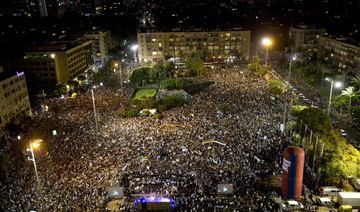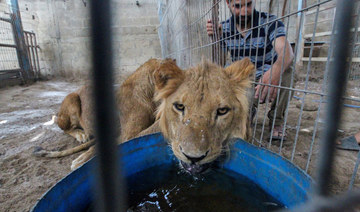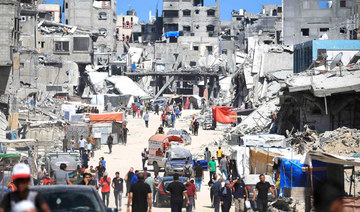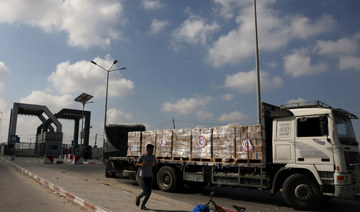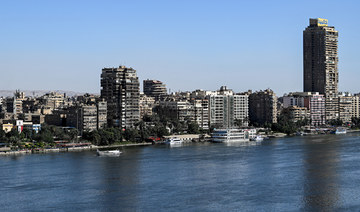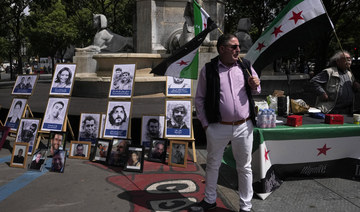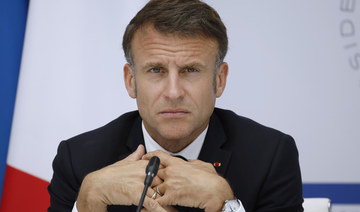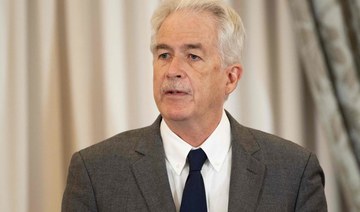JERUSALEM: Prime Minister Benjamin Netanyahu on Sunday defended a law which has outraged Israel’s Druze minority, saying it would help prevent Palestinians and illegal migrants from seeking Israeli citizenship.
“The Nation-State Law prevents, for example, the exploitation of the family reunification clause under which very, very many Palestinians have been absorbed into the country,” he said at the start of the weekly cabinet meeting.
“It could be that this law will also be able to assist us in blocking the future entry of labor migrants,” he said in Hebrew.
The law, which passed last month, is part of Israel’s so-called basic laws, a de facto constitution.
It makes no mention of equality or democracy, implying that the country’s Jewish character takes precedence, and speaks of Israel as the historic homeland of the Jews, who have a “unique” right to self-determination within its borders.
Arabs have strongly criticized the legislation, particularly those from Israel’s 130,000-strong Druze community, who say it makes them second-class citizens even though, unlike other Arabs, they are subject to compulsory service in the military or police alongside Jewish Israelis.
“The state of Israel is the national state of the Jewish people. Israel is a Jewish and democratic state. Individual rights are anchored in many laws,” Netanyahu said Sunday.
“Nobody has harmed — and nobody intends to harm — these individual rights but without the Nation-State Law it will be impossible to ensure for (future) generations the future of Israel as a Jewish national state.”
Netanyahu spoke of the “deep bond” between the Jewish state and the Druze, and he announced the formation of a special ministerial committee to boost relations.
Tens of thousands of Druze and their supporters rallied in central Tel Aviv on Saturday to protest against the legislation.
“Despite our unlimited loyalty to the state, the state doesn’t consider us equals,” Israeli Druze spiritual leader Sheikh Muafak Tarif said in a speech at the rally.
Israel PM defends law in face of Druze outrage
Israel PM defends law in face of Druze outrage

- The nation-state law makes no mention of equality or democracy, implying that the country’s Jewish character takes precedence
- Tens of thousands of Druze and their supporters rallied in central Tel Aviv on Saturday to protest against the legislation
Egyptian sports critic to sue authorities in Israel after Shin Bet confuses him with Hamas member
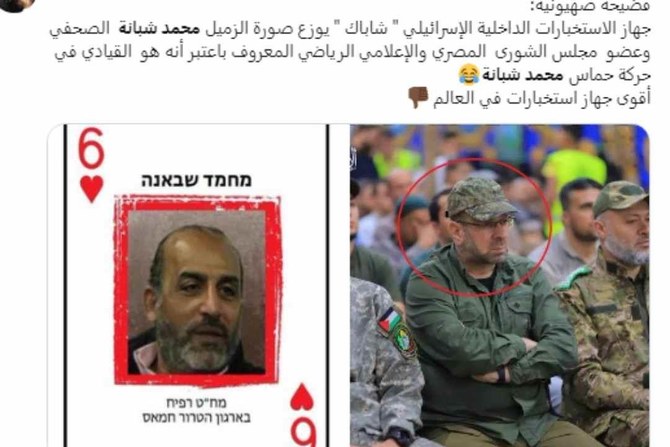
- Media expert Hassan Makawi says simple Internet search would have uncovered ‘appalling mistake’
- He says fiasco shows Israeli media reports ‘must be scrutinized closely’
CAIRO: Egyptian sports critic Mohamed Shabana plans to sue authorities in Israel for defamation after Israeli security agency Shin Bet published his photograph by mistake instead of an image of a Hamas leader in Rafah who it believed had been killed.
Shabana said he would demand substantial compensation for the damage inflicted on him, his family, and his audience in the Egyptian media.
He also said his political career was being damaged following the incident.
He said he would donate the compensation to the “Palestinian cause — a cause we all fight for.”
Shin Bet sparked controversy on social media after posting a picture of Shabana, claiming that he was a Hamas leader killed in Rafah.
Local Israeli media initially reported the assassination of Mohammed Shabana in Rafah, a leader of the Rafah brigade of the Al-Qassam Brigades, using an image of the Egyptian media personality.
However, the Israeli media immediately corrected the error, acknowledging the failure of the assassination attempt, as reported by Yedioth Ahronoth.
The blunder sparked an initial social media uproar, with the Egyptian sports audience recognizing Shabana, making a mockery of the incident.
The fiasco also raised doubts about the capabilities of Shin Bet, which not only posted the incorrect image of a Hamas leader but also failed in the assassination attempt.
Shabana told Arab News that he came across a photo of himself trending on social media, accompanied by sarcastic comments about the Israeli army.
He said: “I did not understand what was happening and began reading to grasp what had occurred.”
Shabana said some friends and family also contacted him over the phone to express their disbelief.
He added: “They joked that the Israeli security service had assassinated me, which made me laugh too. But it did not take long before I realized how ignorant and backward the Israeli security agencies were, fabricating events, which makes me doubt everything they say.
“I know that Shin Bet is one of the strongest security agencies in Israel, and it’s unnatural for them to make such a mistake.
“But I think the chaos in the Israeli state made them fabricate or even mishandle the accuracy of their publications.
“Perhaps they Googled the name Mohammed Shabana, the leader in Hamas, and my photo popped up, so they published it, which is quite ridiculous.”
Media expert Hassan Makawi said: “What happened is a major blunder for the Israeli security forces. But the bigger blunder, in my opinion, is that of the Israeli media, which followed its agency without verifying the facts.”
Makawi said a simple Internet search would have “uncovered their appalling mistake.”
Makawi told Arab News: “It’s clear that Israel is not as strong as they claim, nor is their media as reliable as it describes itself.
“Therefore, we must scrutinize their statements and publications as they may contain many lies.”
Heavy seas batter US Gaza maritime aid mission, CENTCOM says
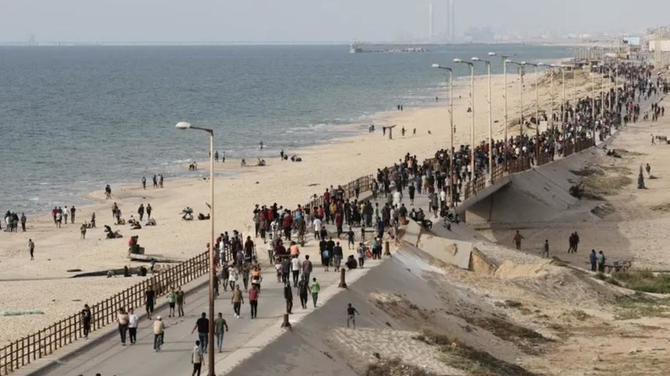
No injuries were reported and the aid pier remains fully functional, CENTCOM said in a statement, adding that no US personnel would enter Gaza.
Two of the affected vessels were now anchored on the beach near the pier and the other two were beached on the coast of Israel near Ashkelon, CENTCOM said, adding that efforts to recover the vessels were under way with assistance from the Israeli Navy.
Rising cost of medicine in Egypt poses risk to ‘thousands of pharmacies’

- That review followed pharmaceutical companies’ request for price increases for various medications
- The EDA’s “decisions over (recent) years to raise the prices of certain types of medicine have resulted in the closure of about 1,500 pharmacies,” said Dr. Hatem El-Badawi
CAIRO: Pharmacy owners in Egypt have voiced concerns about the rising cost of pharmaceuticals in the country as they prepare for another price increase following the Egyptian Drug Authority’s recent review.
That review followed pharmaceutical companies’ request for price increases for various medications to “offset the rising costs of production, which have been exacerbated by the devaluation of the Egyptian pound against the dollar.”
The EDA’s “decisions over (recent) years to raise the prices of certain types of medicine have resulted in the closure of about 1,500 pharmacies,” said Dr. Hatem El-Badawi, secretary-general of the Pharmacy Division at the Federation of Egyptian Chambers of Commerce, adding that the “uncontrolled” rise in medicine prices has not been matched by a corresponding increase in profit margins for pharmacists.
“We anticipate more closures in 2024,” he added. “In February, the General Federation of Egyptian Chambers of Commerce appealed to the Central Bank governor to reactivate the low-interest rate loan of 5 percent for small and medium-sized pharmacies, capped at EGP500,000 ($10,600) per pharmacy.
“The goal was to safeguard pharmacies from economic challenges such as low purchasing power, cash payment demands from pharmaceutical companies, limited liquidity, rising operating costs, and shrinking profit margins.”
That proposal was rejected, however, and loans are currently only available at a 15-percent interest rate, which is, El-Badawi said, “far higher than a pharmacist’s profit margins and thus constitutes a loss.”
Pharmacy owner Dr. Sami Saad told Arab News: “We face several problems due to price increases, including reduced profit margins for pharmacists, dual pricing for drugs, and pharmaceutical companies not recalling expired products. All these issues could force us to close at any time because we are not making any profit.”
Saad added the Egyptian Drug Authority had not considered pharmacists’ demands or the crises they are facing.
“Every day is a struggle. And although I heard that the head of the authority plans to intervene to resolve these issues, there has been no progress so far,” he said.
Dr. El-Badawi reiterated: “I fear for the closure of pharmacies — a difficult situation that will only get worse. I am concerned for the 85,000 pharmacies across the country.
“The health of Egyptians is at risk,” he added. “I urge all responsible authorities to intervene.”
More than one in four Syrians ‘extremely poor’: World Bank
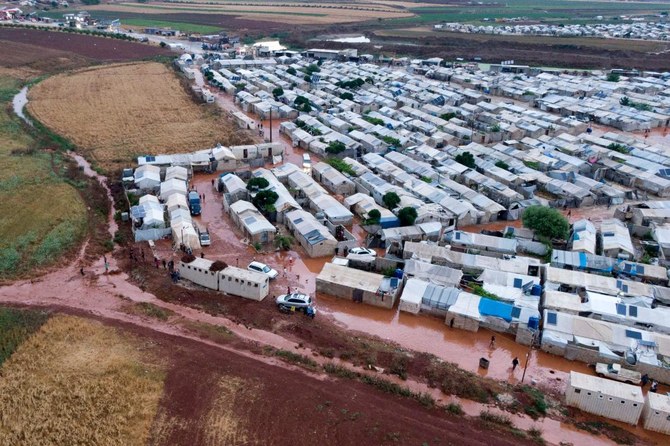
- 27 percent of Syrians — about 5.7 million individuals — live in extreme poverty
- “Continued funding shortfalls and limited access to humanitarian assistance” have further strained poor Syrians, the World Bank said
BEIRUT: More than a quarter of Syrians live in extreme poverty, the World Bank said Saturday, 13 years into a devastating civil war that has battered the economy and impoverished millions.
The World Bank published two new reports on Syria, which found that “27 percent of Syrians — about 5.7 million individuals — live in extreme poverty.”
“Extreme poverty, while virtually non-existent before the conflict, affected more than one in four Syrians in 2022” and might have further deteriorated after a deadly earthquake last year, one of the reports said.
The quake killed about 6,000 people in the country.
According to the United Nations, about 90 percent of Syrians live in poverty, while it previously estimated that around 2 million lived in extreme poverty after more than a decade of war.
The report cited neighbor Lebanon’s economic meltdown in late 2019, the Covid-19 pandemic and the war in Ukraine, as having eroded the welfare of Syrian households in recent years.
The civil war in Syria has also ravaged the economy, infrastructure and industry, while Western sanctions have added to the country’s woes.
“Continued funding shortfalls and limited access to humanitarian assistance” have further strained poor Syrians, already coping with “soaring prices, reduced access to essential services and rising unemployment,” the World Bank said.
The UN told AFP previously that its humanitarian response plan for Syria for 2024 requires more than $4 billion but that it is only six percent funded.
The international community is set to meet in Brussels Monday to try and muster funds for Syria at a yearly pledging conference.
A lack of opportunities and dwindling aid has pushed many Syrians to rely on money sent from relatives abroad to survive, with the World Bank estimating that “in 2022, the total value of remittances received by Syrian households reached about $1.05 billion.”
Syria’s estimated GDP stood at around $6.2 billion in 2023.
Syria’s “real GDP is projected to contract by 1.5 percent in 2024, extending the 1.2 percent decline in 2023,” the report said.
“Inflation is anticipated to remain high in 2024 due to the pass-through effects of currency depreciation, along with persistent shortages and potential further subsidy cuts (for) food and fuel,” it said.
Syria’s war has killed more than half a million people and displaced millions more since it erupted in 2011 after Damascus cracked down on anti-government protests.
Israel official says ‘intention’ to renew Gaza talks ‘this week’
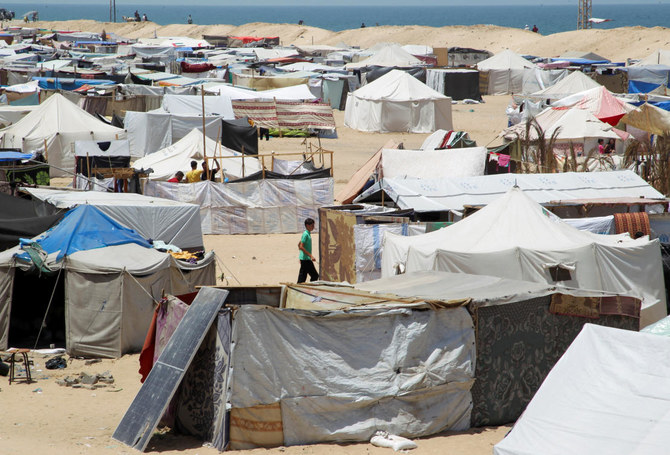
- “There is an intention to renew the talks this week and there is an agreement,” said the official
- The official did not elaborate on the agreement
JERUSALEM: An Israeli official said Saturday the government had an “intention” to renew “this week” talks aimed at reaching a hostage release deal in Gaza, after a meeting in Paris between US and Israeli officials.
“There is an intention to renew the talks this week and there is an agreement,” the official told AFP on condition of anonymity.
The Israeli official did not elaborate on the agreement, but Israeli media reported that Mossad chief David Barnea had agreed during meetings in Paris with mediators CIA Director Bill Burns and Qatari Prime Minister Mohammed bin Abdulrahman Al-Thani on a new framework for the stalled negotiations.
Top US diplomat Antony Blinken also spoke with Israeli war cabinet minister Benny Gantz about new efforts to achieve a ceasefire and reopen the Rafah border crossing, Washington said.
Talks aimed at reaching a hostage release and truce deal in the Gaza Strip ground to a halt this month after Israel launched a military operation in the territory’s far-southern city of Rafah.
The Gaza war broke out after Hamas’s October 7 attack resulted in the deaths of more than 1,170 people, mostly civilians, according to an AFP tally based on Israeli official figures.
Militants also took 252 hostages, 121 of whom remain in Gaza, including 37 the army says are dead.
Israel’s retaliatory offensive has killed at least 35,903 people in Gaza, mostly women and children, according to data from the Hamas-run territory’s health ministry.


